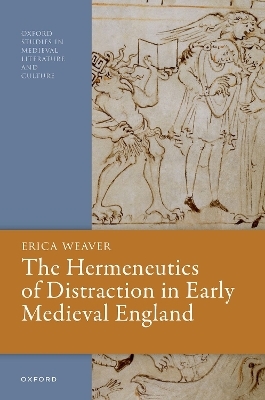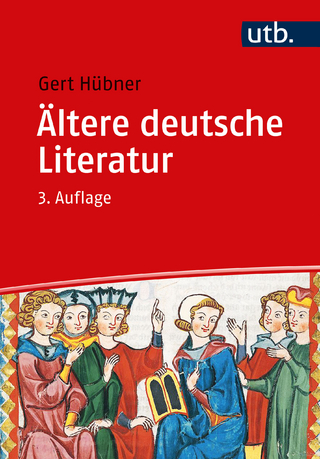
The Hermeneutics of Distraction in Early Medieval England
Seiten
2025
Oxford University Press (Verlag)
978-0-19-892209-4 (ISBN)
Oxford University Press (Verlag)
978-0-19-892209-4 (ISBN)
- Noch nicht erschienen (ca. März 2025)
- Versandkostenfrei innerhalb Deutschlands
- Auch auf Rechnung
- Verfügbarkeit in der Filiale vor Ort prüfen
- Artikel merken
This book writes the cultural and intellectual history of distraction through the study of the affective practices of a particular community of medieval writers and readers: the influential circle of Æthelwold (Bishop of Winchester, 963-984).
Distraction is now too easily and often considered a metonym for modern consciousness, but it was also a medieval concern, which posed a particular threat to religious life. Distraction opened the door to all other temptations, and—most disturbingly of all for the monastic communities at the heart of this book—it invalidated central devotional acts like reading, praying, and reciting the Psalms. Far from an innocuous sensation, distraction posed a significant spiritual danger. It also generated powerful countervailing responses in literature, pedagogy, and religious observance, profoundly shaping literary interpretation in the process.
The Hermeneutics of Distraction in Early Medieval England writes this cultural and intellectual history. It comes at the topic of distraction through the study of the affective practices of a particular community of writers and readers: the influential circle of Æthelwold (Bishop of Winchester, 963-984). It also explores the implications of this focused study both for a larger historical context (Western monasticism from the fifth century to the twelfth) and for the history of a unifying concept (the experience of distraction). In doing so, this book reveals that the pervasive threat of distraction precipitated the development of several different tactics for reorienting attention, especially in the tenth-century monastic correction movement traditionally known as the Benedictine Reform, which reshaped monastic life across Europe. From the development of the 'hermeneutic style' to new textual and theatrical modes, these correctional projects make visible an enduring problem, present from the beginnings of monasticism and persisting throughout its long history.
Distraction is now too easily and often considered a metonym for modern consciousness, but it was also a medieval concern, which posed a particular threat to religious life. Distraction opened the door to all other temptations, and—most disturbingly of all for the monastic communities at the heart of this book—it invalidated central devotional acts like reading, praying, and reciting the Psalms. Far from an innocuous sensation, distraction posed a significant spiritual danger. It also generated powerful countervailing responses in literature, pedagogy, and religious observance, profoundly shaping literary interpretation in the process.
The Hermeneutics of Distraction in Early Medieval England writes this cultural and intellectual history. It comes at the topic of distraction through the study of the affective practices of a particular community of writers and readers: the influential circle of Æthelwold (Bishop of Winchester, 963-984). It also explores the implications of this focused study both for a larger historical context (Western monasticism from the fifth century to the twelfth) and for the history of a unifying concept (the experience of distraction). In doing so, this book reveals that the pervasive threat of distraction precipitated the development of several different tactics for reorienting attention, especially in the tenth-century monastic correction movement traditionally known as the Benedictine Reform, which reshaped monastic life across Europe. From the development of the 'hermeneutic style' to new textual and theatrical modes, these correctional projects make visible an enduring problem, present from the beginnings of monasticism and persisting throughout its long history.
Erica Weaver is Assistant Professor of English at the University of California, Los Angeles. She has published widely in New Literary History, Representations, Anglo-Saxon England, and elsewhere, and her article on the Old English Boethius was awarded the Paul E. Szarmach Prize. She is also co-editor, with A. Joseph McMullen, of The Legacy of Boethius in Medieval England: The Consolation and its Afterlives and, with Daniel C. Remein, of Dating Beowulf: Studies in Intimacy. She studied English and Medieval and Renaissance Studies at Columbia University, summa cum laude, before completing her PhD in English at Harvard.
| Erscheint lt. Verlag | 13.3.2025 |
|---|---|
| Reihe/Serie | Oxford Studies in Medieval Literature and Culture |
| Zusatzinfo | 4 black-and-white figures |
| Verlagsort | Oxford |
| Sprache | englisch |
| Maße | 156 x 234 mm |
| Themenwelt | Geschichte ► Allgemeine Geschichte ► Mittelalter |
| Religion / Theologie ► Christentum ► Kirchengeschichte | |
| Geisteswissenschaften ► Sprach- / Literaturwissenschaft ► Anglistik / Amerikanistik | |
| Geisteswissenschaften ► Sprach- / Literaturwissenschaft ► Literaturwissenschaft | |
| ISBN-10 | 0-19-892209-4 / 0198922094 |
| ISBN-13 | 978-0-19-892209-4 / 9780198922094 |
| Zustand | Neuware |
| Haben Sie eine Frage zum Produkt? |
Mehr entdecken
aus dem Bereich
aus dem Bereich
eine neue Geschichte des Mittelalters
Buch | Hardcover (2023)
C.H.Beck (Verlag)
38,00 €


